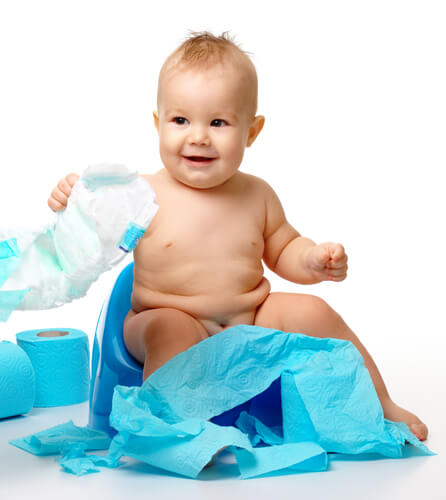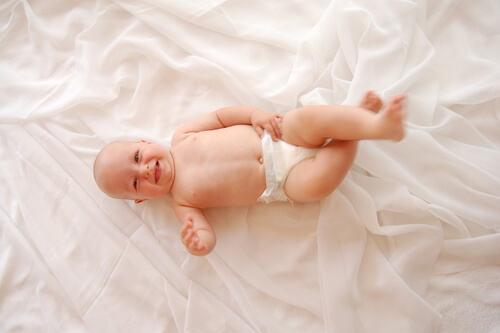When Should Your Child Stop Using Diapers?

Children develop in stages. Today, let’s talk about the stage when your child should stop using diapers.
Potty training represents one of the most important challenges (and achievements) that our children must face in the first few years of their life.
Both parents and children must be involved in the potty training process; but the most important thing is to do it at the right time.
Why is it so important to potty train?
Diapers become the item that your baby uses the most. It is the first accessory used after birth. We could even say that children’s security is forged around this “new body part.”
It can be quite difficult to get them to stop using diapers, especially if it’s at the wrong developmental stage.
However, once the process starts, the child approaches a stage of autonomy and knowledge of their own body and its functioning.
Potty training leads your child into a new stage in their social and emotional development. They will lose an item that once made them feel secure, but they will then gain a new sense of freedom.
When should potty training begin?

Children’s development is an ever-evolving process. Recognize that parents may make big changes without considering the implications.
Without even realizing it, as parents, we could be helping our children grow up, but we could also harm them.
If we don’t know the appropriate stage when our child should stop using diapers, we can generate emotional and social difficulties for our little ones that can accompany them until their adult life.
In order to identify this stage appropriately, we must make sure the following have occurred:
- The best time to begin potty training is between 18 months and 2 years of age, as long as there are no biological or physiological irregularities.
- The baby must have reached neurological maturity, which allows them to control themselves.
- They should be able to recognize if their diaper is wet or the texture has changed.
- They must be able to notice that something is uncomfortable.
- They want to imitate their parents in terms of bathroom use.
If we can identify these criteria in our child, we can begin to work with the techniques of potty training and gradually stop using diapers.
For example, to see if they are in this stage, we can try to give them plenty of fluids and wait a couple of hours to see how they react when they feel the need to urinate.
Maybe they will give us a sign like touching their diaper, making a specific facial expression or starting to move in a certain way. This action will indicate that the child is aware of what they are experiencing and is not in a stage where it is still normal to need diapers.

Children should not be forced to overcome stages to which they have not yet arrived. For example, in the first stage of bladder control, the child makes an indication that they are wet when the need to urinate has already passed.
In more advanced stages, they will tell us that they are urinating. In the next one, they warn us before it happens. When we are sure they have passed all three stages, then it is time to stop using diapers and start potty training.
Note that this process is slow, but constantly evolving. Show interest, observe the signals that your child gives you and encourage them with sweet words and gestures. Praise every small progression to encourage future progress.
Children develop in stages. Today, let’s talk about the stage when your child should stop using diapers.
Potty training represents one of the most important challenges (and achievements) that our children must face in the first few years of their life.
Both parents and children must be involved in the potty training process; but the most important thing is to do it at the right time.
Why is it so important to potty train?
Diapers become the item that your baby uses the most. It is the first accessory used after birth. We could even say that children’s security is forged around this “new body part.”
It can be quite difficult to get them to stop using diapers, especially if it’s at the wrong developmental stage.
However, once the process starts, the child approaches a stage of autonomy and knowledge of their own body and its functioning.
Potty training leads your child into a new stage in their social and emotional development. They will lose an item that once made them feel secure, but they will then gain a new sense of freedom.
When should potty training begin?

Children’s development is an ever-evolving process. Recognize that parents may make big changes without considering the implications.
Without even realizing it, as parents, we could be helping our children grow up, but we could also harm them.
If we don’t know the appropriate stage when our child should stop using diapers, we can generate emotional and social difficulties for our little ones that can accompany them until their adult life.
In order to identify this stage appropriately, we must make sure the following have occurred:
- The best time to begin potty training is between 18 months and 2 years of age, as long as there are no biological or physiological irregularities.
- The baby must have reached neurological maturity, which allows them to control themselves.
- They should be able to recognize if their diaper is wet or the texture has changed.
- They must be able to notice that something is uncomfortable.
- They want to imitate their parents in terms of bathroom use.
If we can identify these criteria in our child, we can begin to work with the techniques of potty training and gradually stop using diapers.
For example, to see if they are in this stage, we can try to give them plenty of fluids and wait a couple of hours to see how they react when they feel the need to urinate.
Maybe they will give us a sign like touching their diaper, making a specific facial expression or starting to move in a certain way. This action will indicate that the child is aware of what they are experiencing and is not in a stage where it is still normal to need diapers.

Children should not be forced to overcome stages to which they have not yet arrived. For example, in the first stage of bladder control, the child makes an indication that they are wet when the need to urinate has already passed.
In more advanced stages, they will tell us that they are urinating. In the next one, they warn us before it happens. When we are sure they have passed all three stages, then it is time to stop using diapers and start potty training.
Note that this process is slow, but constantly evolving. Show interest, observe the signals that your child gives you and encourage them with sweet words and gestures. Praise every small progression to encourage future progress.
This text is provided for informational purposes only and does not replace consultation with a professional. If in doubt, consult your specialist.








